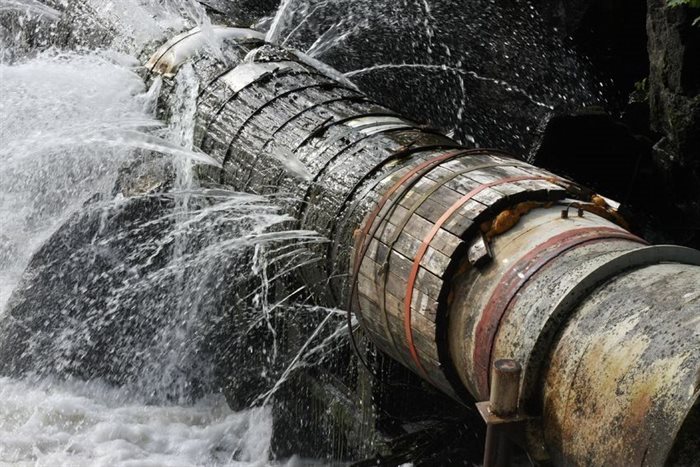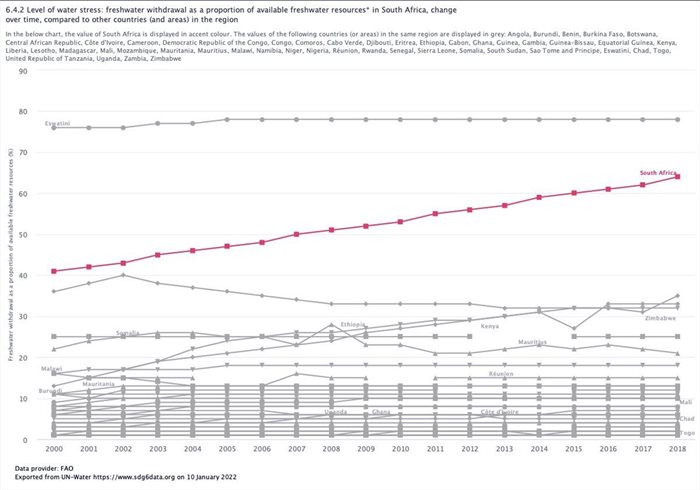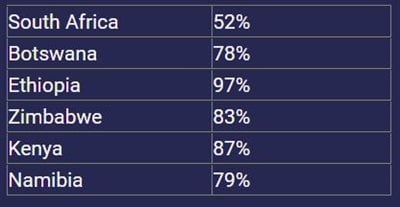When blood stops flowing, the body dies. Similarly, when water stops flowing, a country "dies". Everybody knows that water is essential to all forms of life, but not everybody shows respect or pays enough attention to this precious commodity. It is terrible to see the impact a lack of water has on animals, plants and our environment - not to mention on humans. It should be equally terrible to witness the callous waste and pollution of water.
With our average rainfall about half that of the world average, South Africa is a water-scarce country. It is estimated that the average amount of water available per person in South Africa is about 2,000m3 - compared to 15,000m3 in the USA. The withdrawal of fresh water from ground or surface water sources (as a percentage of available water) has increased from about 42% to roughly 64% in South Africa between the period 2000 and 2018. In comparison, the graphs of other African countries are flat (and below 40%):
Water resources are being polluted on a frightening scale. Below is an extract from a UN Report comparing the proportion of good quality, raw water available in a couple of African countries. Here again, South Africa's results are cause for concern:
In spite of these alarming facts, it is mind-boggling that our country’s leaders and citizens seem to have a complete lack of urgency and motivation to rectify the situation. Hundreds of faulty municipal water and sewage plants can be found all over the country, while thousands of litres of water continue to be lost every day due to poorly maintained pipelines.
Plastic pipe is dominant in secondary water distribution and therefore a key factor in the country’s infrastructure. As the only major pipe association in South Africa, Sappma represents more than 80% of all certified plastic pipe produced in the country. Two of our main areas of focus are product standards and quality - both of which are indispensable in the bigger picture of ensuring water safety and security for every citizen and preserving our country’s water resources. Sappma is a voluntary, non-profit organisation which works not only for the well-being of the plastics pipe industry, but also for the welfare of the people of the country.
Without readily available, clean water, personal hygiene and health is not possible. Government (the Department of Water and Sanitation) is the custodian of water resources in the country and therefore responsible for the protection, development, conservation and proper management in a sustainable and equitable manner, for the benefit of all people and in accordance with its constitutional mandate. Sappma is therefore again making a the following urgent appeals to government:
- To seriously address the widespread pollution of rivers, dams and wetlands
- To intervene in the mismanagement of municipal water and sewage treatment plants
- To de-politicise the management of water in the country and fully utilise all the available engineering skills in the country.
In addition to the above, Sappma is also advocating for the saving of water with good quality plastic pipes that are durable, leak-free and properly installed. Corroding pipes and poor jointing are two of the major causes of water loss. For this reason, old steel or asbestos pipes around the world are being replaced with plastic pipes that do not rust and have leak-proof joints (if done correctly).
Need to replace old infrastructure
A great deal of municipal pipe networks are beyond their useful life and should have already been replaced. The consequence of failing to do so is the substantial loss of precious, treated water in most municipal areas. This is clearly something that the country cannot afford. The benefits of using plastic pipe as opposed to other materials have been well documented and tested. Apart from having a lifetime that is more than double of that of other materials, plastic pipes are also quicker and easier to install, have lower failure rates, less corrosion, fewer joint leaks and are lower in price compared to the other pipes.
Without delay, municipalities should spend the money allocated in their budgets to upgrade and replace old and failing water infrastructure. This will place us in the position to save enough purified water to significantly reduce the impact and long-term effects of the below-average rainfall and avoid the threat of “water shedding” in the months to come.

































